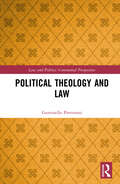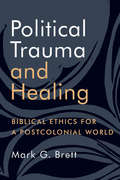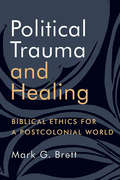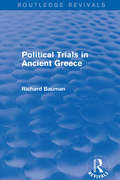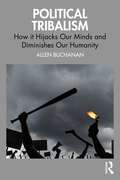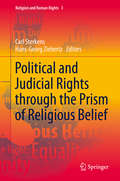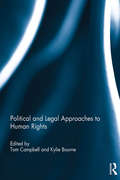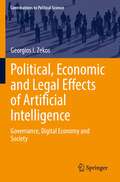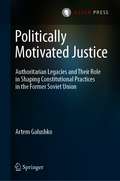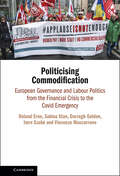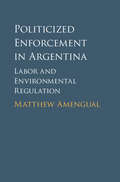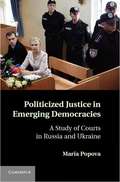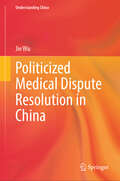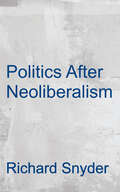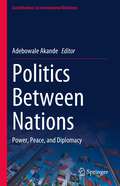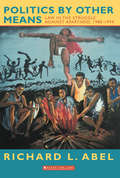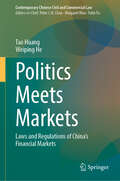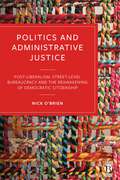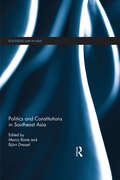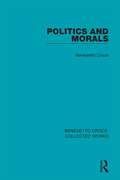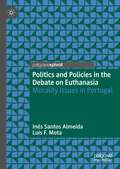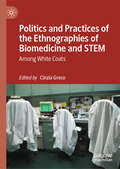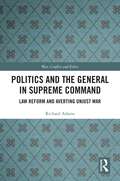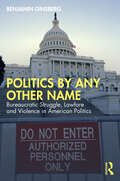- Table View
- List View
Political Theology and Law (Law and Politics)
by Geminello PreterossiThis book addresses two main questions. Can political theology be overcome? And, is what today – in referring to neoliberalism and its genealogy – many define as "economic theology" truly an alternative to political theology, as Foucault has claimed and as Agamben does today? As a first step, the book addresses and clarifies various misunderstandings about the notion of political theology, in its multiple and even opposite meanings. It then focuses on a conceptualisation inaugurated by Carl Schmitt, which sees political theology as the eloquent matrix of modern politics: insofar as the latter produces and continuously re-elaborates an "excess" that does not belong to it, its core remains theological-political, although secularised. The bulk of the book then pursues a reading of the analogic connection between juridico-political concepts and theological-metaphysical concepts; arguing that, although the ‘turn’ to economic theology is indeed another form of political theology, it is a deeply anti-political one, which forecloses modes of resistance. The book will be of interest to scholars, researchers and advanced students in the fields of modern political and legal philosophy and those researching the crisis of its legacy. In particular, it is addressed to those who study the relationship between theology (and its substitutes, such as hegemony and political myth) and politics, power and law, legitimacy and legality, in the perspective of secularization. In addition, the book offers a contribution to contemporary critical studies on the neoliberal state and the return of the "state of exception" in democracies, as well as a questioning of the moralization of law, which is an effect of globalist ideology and the "humanitarian turn" after 1989.
Political Trauma and Healing: Biblical Ethics for a Postcolonial World
by Mark G. BrettHow can Scripture address the crucial justice issues of our time? In this book Mark Brett offers a careful reading of biblical texts that speak to such pressing public issues as the legacies of colonialism, the demands of asylum seekers, the challenges of climate change, and the shaping of redemptive economies. Brett argues that the Hebrew Bible can be read as a series of reflections on political trauma and healing — the long saga of successive ancient empires violently asserting their sovereignty over Israel and of the Israelites forced to live out new pathways toward restoration. Brett retrieves the prophetic voice of Scripture and applies it to our contemporary world, addressing current justice issues in a relevant, constructive, compelling manner.
Political Trauma and Healing: Biblical Ethics for a Postcolonial World
by Mark G. BrettHow can Scripture address the crucial justice issues of our time? In this book Mark Brett offers a careful reading of biblical texts that speak to such pressing public issues as the legacies of colonialism, the demands of asylum seekers, the challenges of climate change, and the shaping of redemptive economies. Brett argues that the Hebrew Bible can be read as a series of reflections on political trauma and healing — the long saga of successive ancient empires violently asserting their sovereignty over Israel and of the Israelites forced to live out new pathways toward restoration. Brett retrieves the prophetic voice of Scripture and applies it to our contemporary world, addressing current justice issues in a relevant, constructive, compelling manner.
Political Trials in Ancient Greece (Routledge Revivals)
by Richard A. BaumanDuring the inspired years of the Athenian empire, through the tragedy of its collapse, to the more prosaic era that followed, most of the great names in Athenian history were involved in the procedures of criminal law. Political Trials in Ancient Greece, first published in 1990, explores the relationships between historical process, constitution, law, political machinations and foreign policy, concentrating on fifth and fourth century Athens and on Macedonia. These trials contribute significant details to our knowledge of such towering figures as Aeschylus, Pericles, Thucydides, Alcibiades, Socrates, Demosthenes and Aristotle, as well as a diverse collection of Macedonian defendants. The jurisdiction of the Areopagus, trials of communities, and the personal jurisdiction of the Macedonian king are also examined. Richard Bauman’s original account broadens our understanding of Greek legal institutions and of the ancient Greek approach to the law, as well as the general ethos of Athenian and Macedonian society.
Political Tribalism: How it Hijacks Our Minds and Diminishes Our Humanity
by Allen BuchananCombining hard data with the author’s personal story of a life in the U.S. South and then as a university professor, this book sheds a new light on tribalistic ideologies. Such ideologies are a deeply troubling feature of civic life in America and in many Western democracies as they erode trust among citizens, sow divisions, and pervert a larger pursuit of truth and understanding. Philosopher Allen Buchanan weaves together his own autobiography with the latest research in psychology, politics, anthropology, and philosophy to better understand the nature and causes of ideological tribalism, its pernicious effects on the individual and society, and the best possible solutions for curbing its spread.The story begins with Buchanan as a middle‑class, White boy in 1950s Arkansas, absorbing and espousing the racist ideas of his parents, church, and community. This beginning intentionally inculpates the author in subsequent criticisms of tribalism and—because Buchanan left this world and came to reject its values—makes convincing his arguments at the book’s conclusion on how to escape tribalism’s tight grasp. Before offering such final prescriptions, Buchanan examines the evolutionary origins of tribalistic thinking and shows how unyielding group ideologies short‑circuit truth‑seeking, attack the meaning and purpose of a liberal education, undermine a shared national identity, and—thanks to social media—prop up a shallow and false self‑identity.With a sharp eye toward tribalistic ideologies on the Right and the Left, Political Tribalism: How it Hijacks Our Minds and Diminishes Our Humanity is a compelling call for a healthier and deeper intellectual life of a democracy’s polity and for its individual citizens.
Political and Judicial Rights through the Prism of Religious Belief (Religion and Human Rights #3)
by Hans-Georg Ziebertz Carl SterkensThis innovative volume is focused on the relationship between religion on the one hand and political and judicial rights on the other. At a time when the so-called ‘checks and balances’ that guarantee the vulnerable equilibrium between legislative, executive and judicial branches of governance are increasingly under pressure, this book offers valuable insights. It presents empirical work that has measured young people’s attitudes and explains the variety found across their views. Readers will find answers to the question: To what extent do youths in different countries support political and judicial human rights and what influences their attitudes towards these rights? The political rights in this question include, among others, active and passive voting right, the right to protest, and the rights of refugees. Judicial rights refer in general to the right of a fair trial, and include principles like equality before the law; the right to independent and impartial judgement; the presumption of innocence; the right to legal counsel; and the privilege against self-incrimination. Expert contributing authors look at aspects such as religious beliefs and practices, personal evaluation of state authorities, and personality characteristics. The authors discuss contextual determinants for attitudes towards political and judicial rights, in both theory and empirical indicators. Numerous helpful tables and figures support the written word. This book makes an original contribution to research through the empirical clarification of factors that induce or reduce people’s support of political and judicial rights. It will appeal to graduates and researchers in religious studies, philosophy or sociology of religion, among other disciplines, but it will also interest the general reader who is concerned with matters of human rights and social justice.
Political and Legal Approaches to Human Rights
by Tom Campbell Kylie BourneThis collection explores and illustrates issues arising from ‘political’ approaches to human rights in contrast to the more traditional ‘moral’ approaches. Moral approaches conceptualize and justify human rights in terms of priority rights which are both universal and moral. In contrast, political approaches focus on those human rights practices involved in the development and operation of human rights institutions, laws and political process, all in relative independence from their alleged moral foundations. The book contributes to the understanding and analysis of ‘political approaches’, including consideration of their diversity, and discussion of their strengths and weaknesses. The choice of contributors presents a balance between those theorists who favour some version of the political approach and those who are dubious about the perceived advantages. The chapters are grouped together in parts which constitute the distinctive issues addressed in the book. At a time when there is considerable uncertainty concerning their conceptual clarity, operation, feasibility, and their normative justifications, this volume will be of interest to those involved with the theory and practice of human rights, within law schools, and in politics and philosophy departments. It will also provide a useful resource for human rights practitioners and policy makers.
Political, Economic and Legal Effects of Artificial Intelligence: Governance, Digital Economy and Society (Contributions to Political Science)
by Georgios I. ZekosThis book presents a comprehensive analysis of the alterations and problems caused by new technologies in all fields of politics. It further examines the impact of artificial intelligence (AI) on the nexus between politics, economics, and law. The book raises and answers several important questions: What is the role of AI in politics? Are people prepared for the challenges presented by technical developments? How will Al affect future politics and human society? How can politics and law deal with Al's disruptive technologies? What impact will AI and technology have on law? How can efficient cooperation between human beings and AI be shaped? Can artificial intelligence automate public decision-making?Topics discussed in the book include, but are not limited to digital governance, public administration, digital economy, corruption, democracy and voting, legal singularity, separation of power, constitutional rights, GDPR in politics, AI personhood, digital politics, cyberspace sovereignty, cyberspace transactions, and human rights. This book is a must-read for scholars and students of political science, law, and economics, as well as policy-makers and practitioners, interested in a better understanding of political, legal, and economic aspects and issues of AI.
Politically Motivated Justice: Authoritarian Legacies and Their Role in Shaping Constitutional Practices in the Former Soviet Union
by Artem GalushkoThe book addresses authoritarian legacies of politically motivated justice and its unwritten practices that have re-emerged in the recent trials related to both political and ordinary criminal charges against prominent opposition leaders in many former Soviet republics. Taking into account that in any country all trials are more or less related to politics, the author differentiates between trials on political issues (political trials that are not necessarily arbitrary) and politicized partisan trials (arbitrary trials against political opponents). The monograph, thus, adopts a broad definition of a political trial, which includes all trials that are related to politicians and political matters such as elections, regime change, activities of parties and other political organizations. The focus lies on a separate group of partisan trials that are politicized (i.e. politically motivated) and which are used by governments to restrain political opposition and dissent.Primarily aimed at legal practitioners such as human rights lawyers, prosecutors, and judges, as well as postgraduates, researchers, teaching assistants and university law professors, readers can gain from the book information that is useful in assessing the interdisciplinary phenomenon of politically motivated criminal justice in transitional and authoritarian post-Soviet republics. Additionally, the volume is indispensable to readers that are interested in Eastern European Studies, Transitional Justice, Law and Society, Slavic Studies, and Theory and History of State and Law.Artem Galushko is a post-doctoral researcher at the Max Planck Institute for the Study of Religious and Ethnic Diversity in Germany.
Politicising Commodification: European Governance and Labour Politics from the Financial Crisis to the Covid Emergency
by Roland Erne Sabina Stan Darragh Golden Imre Szabó Vincenzo MaccarroneThis book examines the new economic governance (NEG) regime that the EU adopted after 2008. Its novel research design captures the supranational formulation of NEG prescriptions and their uneven deployment across countries (Germany, Italy, Ireland, Romania), policy areas (employment relations, public services), and sectors (transport, water, healthcare). NEG led to a much more vertical mode of EU integration, and its commodification agenda unleashed a plethora of union and social-movement protests, including transnationally. The book presents findings that are crucial for the prospects of European democracy, as labour politics is essential in framing the struggles about the direction of NEG along a commodification–decommodification axis rather than a national–EU axis. To shed light on corresponding processes at EU level, it upscales insights on the historical role that labour movements have played in the development of democracy and welfare states. This title is also available as Open Access on Cambridge Core.
Politicized Enforcement in Argentina
by Matthew AmengualCountries throughout the world have passed regulations that promise protection for workers and the environment, but violations of these policies are more common than compliance. All too often, limitations of state capacity and political will intertwine hindering enforcement. Why do states enforce regulations in some places, and in some industries, but not in others? In Politicized Enforcement in Argentina, Amengual develops a framework for analyzing enforcement in middle-income and developing countries, showing how informal linkages between state officials and groups within society allow officials to gain the operational resources and political support necessary for enforcement. This analysis builds on state-society approaches in comparative politics, but in contrast to theories that emphasize state autonomy, it focuses on key differences in the way states are porous to political influence.
Politicized Justice in Emerging Democracies
by Maria PopovaWhy are independent courts rarely found in emerging democracies? This book moves beyond familiar obstacles, such as an inhospitable legal legacy and formal institutions that expose judges to political pressure. It proposes a strategic pressure theory, which claims that in emerging democracies, political competition eggs on rather than restrains power-hungry politicians. Incumbents who are losing their grip on power try to use the courts to hang on, which leads to the politicization of justice. The analysis uses four original datasets, containing 1,000 decisions by Russian and Ukrainian lower courts from 1998 to 2004. The main finding is that justice is politicized in both countries, but in the more competitive regime (Ukraine) incumbents leaned more forcefully on the courts and obtained more favorable rulings.
Politicized Medical Dispute Resolution in China (Understanding China)
by Jie WuThis book investigates the politicization process of social dispute resolution and its unintended consequences, under the context of over 70 percent of China’s public hospitals have experienced hospital violence, with patients acting violently toward medical workers to express anger, protect their rights, or monetary reasons. The examination of interactions between patients, hospitals, and government representatives in China is based on fieldwork conducted in a Chinese mega-city from 2015 to 2017, combining over 700 archival mediation cases, 156 hospital violence cases and their legal outcomes, and 72 in-depth interviews with patients, mediators, and healthcare professionals. It examines the rise of mediation and finds how the party-state utilizes the traditional mediation channel to address emerging social disputes, and the art of persuasion in mediation and finds how political stability and moral concerns influence and shaped their strategies and mediation outcomes. The first-hand data and valuable archival documents help depict citizens’ social dispute resolution process and reflect another facet of non-electoral political participation in China, also enriching the understanding of evolving government strategies in dispute resolution. This book is reader-friendly and could engage a wide and dynamic audience of researchers, healthcare professionals, and readers interested in medical sociology, regional study, or political participation in China.
Politics After Neoliberalism: Reregulation in Mexico (Cambridge Studies in Comparative Politics)
by Robert H. Bates Richard Snyder Ellen Comisso Peter Lange Joel Migdal Helen MilnerThe shift from state-led to market-oriented, neoliberal economic policies has been one of the most important changes in the developing world during the last two decades. Although much existing research has focused on why countries choose these neoliberal policy reforms and how they implement them, Richard Snyder's study offers an analysis of politics after neoliberalism. The book proposes a framework that explains how neoliberal reforms, rather than unleashing market forces, actually trigger 're-regulation' processes involving strategic interactions between political entrepreneurs and societal groups. Depending on the strengths and strategies of politicians and societal groups, reregulation results in different types of new institutions for market governance with contrasting consequences for economic efficiency and social justice. This framework is used in conjunction with an innovative subnational comparative method to analyze evidence from four Mexican states about the politics of reregulation.
Politics Between Nations: Power, Peace, and Diplomacy (Contributions to International Relations)
by Adebowale AkandeThis multidisciplinary volume examines the meaning of global conflict and cooperation by international actors that can be caused by dis- or misinformation to people and discusses how to build diplomacy for peace and regional cooperation. The book further identifies boundaries of the relationships among the various governments of the world, transatlantic alliances, international organizations, non-governmental organizations, transnational corporations, and the overall interdependence of nations in the making of the modern world. Topics discussed in this volume include diplomacy, international relations theory, Eurasia politics, European Union, Brexit, Taliban taking over of Kabul government, and the ongoing Afghanistan conflict, terrorism, ISIS and Al Qaeda, international law, international organizations, interstate and intrastate war, threats and challenges, global civil society, religion, and culture. The volume advances contemporary theories and concepts to explain these issues concerning peoples and cultures in the complex world we live in. The book is a must-read for students, researchers, and scholars of international relations, political science, political history, political geography, economics, and law in general, as well as diplomacy, political communication, and security studies in particular.
Politics By Other Means: Law in the Struggle Against Apartheid, 1980-1994
by Richard AbelPolitics by Other Means explores the fundamental question of how law can constrain political power by offering a pathbreaking account of the triumphant final decade of the struggle against apartheid. Richard Abel presents case studies of ten major legal campaigns including: challenges to pass laws; black trade union demands for recognition; state terror; censorship; resistance to the "independent" homelands; and treason trials.
Politics Meets Markets: Laws and Regulations of China’s Financial Markets (Contemporary Chinese Civil and Commercial Law)
by Tao Huang Weiping HeThe book highlights several aspects with 'Chinese characteristics' that set the country's financial system apart. One key element is the significant influence of the Communist Party of China (CPC) on the financial markets. The Party plays a crucial role in shaping and driving policies within the financial sector, reflecting a distinct interplay between politics and finance. Additionally, the book emphasizes the involvement of various authorities within the government, the court system, and the intricate relationship between the courts and the governments in influencing the dynamics of the financial markets. These factors collectively contribute to a distinctive environment that cannot be fully understood through conventional theoretical frameworks. The major analytical points of the book revolve around the intricate triangular relationships among China's politics, financial market rules, and the financial markets themselves. The authors argue that relying solely on any existing school of thoughts is insufficient for comprehending the complexities of China's financial landscape. Instead, the book explores the multifaceted connections between politics, courts, and the financial markets. It delves into how political forces drive the formulation, development, and enforcement of financial market rules, including the roles played by various government bodies and the legal system. Unlike a focus on regulations and rules merely 'on paper,' the book takes a grounded approach by investigating China's financial markets rules in practical terms. By doing so, it seeks to discover the underlying logic behind the unique features of China's financial system, providing a nuanced understanding of the interactions between political forces, legal frameworks, and the financial markets in the Chinese context.
Politics and Administrative Justice: Postliberalism, Street-Level Bureaucracy and the Reawakening of Democratic Citizenship
by Nick O’BrienIn recent years, failures in health and social care, mental health services, public housing and education have dominated headlines and been the subject of much public debate. The means for addressing such concerns remain notably legalistic and subject to a particular brand of liberal legalism that stifles the possibility of transformational intervention. This book argues that there is urgent need for a radical reassessment of the way the law mediates between citizens and the state. Drawing on historical and comparative research, literary, pictorial and cinematic treatments, and the insights of the disability rights movement, Nick O’Brien examines how the everyday regulation of street-level bureaucracy can play an integral part in reimagining postliberal politics and the role of the law.
Politics and Constitutions in Southeast Asia (Routledge Law in Asia)
by Marco Bünte Björn DresselIn recent years the constitutional landscape of Southeast Asia has changed tremendously. Against a worldwide background of liberalization, globalization, and democratization, states in the region have begun to alter their constitutions, reinforcing human rights provisions, and putting in place institutional safeguards, such as constitutional courts and human rights commissions. On closer examination, however, the picture is very complex, with constitutional developments differing greatly between states. This book explores a range of current constitutional developments in the different states of Southeast Asia through a distinct political lens. Drawing on comparative and single case studies, it considers various constitutional areas, including constitution drafting, human rights, legal safeguards and the continuing role of the military, sets constitutional developments in the wider political and historical context of each country, and makes comparisons both with Western democracies and with other developing regions. The book concludes by assessing overall how far constitutional practices and trajectories are converging towards a liberal Western model or towards a distinctly Southeast Asian model.
Politics and Morals (Collected Works)
by Benedetto CroceOriginally published in 1946, this book reveals Croce’s dynamic conception of liberty, liberalism and the relation of individual morality to the State. The State which he discusses is more than a national government; it is a historical conception which takes in all ‘states’ - local and international. The volume provides an inspired analysis of the relation of politics and morals, individual liberty, free enterprise and pragmatic social judgement.
Politics and Policies in the Debate on Euthanasia: Morality Issues in Portugal
by Inês Santos Almeida Luís F. MotaThis book analyses the political and public debates about euthanasia in Portugal. Utilising petitions submitted to Parliament, legislative bills, parliamentary debates, opinion articles in newspapers, and documents published by the Catholic Church, it examines this sensitive issue through the theoretical lens of morality politics. It does so by studying the process of political dispute between advocacy coalitions formed by political parties and societal actors. This is the first book to comprehensively analyse a morality issue in Portugal, a predominantly Catholic country that has taken an innovative and liberal stance on many morality issues over the last two decades. It will appeal to students and scholars of sociology, political science, public policy and bioethics, as well as policymakers and other interest groups.
Politics and Practices of the Ethnographies of Biomedicine and STEM: Among White Coats
by Cinzia GrecoPolitics and Practices of the Ethnographies of Biomedicine and STEM: Among White Coats collects critical examinations of the politics, positionality, and epistemological and methodological issues of doing ethnography in a number of locales across the globe and in fields including computer science, astronomy, mining, biology, and medicine. The book captures a wide breadth of ethnographic case studies conducted by scholars at different stages of their careers, with various geographical backgrounds, and working across different settings and regions of the world, demonstrating the unfolding of overlapping concerns in unique ways. ‘Among White Coats’ is the first systematic and critical examination of the politics and epistemology of doing ethnography in biomedicine and STEM, adding to the extensive production of studies based on the ethnography of medicine and ethnography of science, as well as the ongoing debate on the foundation of ethnography. The book is geared toward academics and research students from different disciplinary backgrounds. It is a resource useful not only for students and Ph.D. candidates but also for expert ethnographers, presenting the most recent debates on ethnography and knowledge production in the STEM and biomedical fields. The book is partly a response to the growing awareness of the increasingly pertinent objective for ethnographers to reflect on their positionalities in their writing. Thus, this book offers a reflexive guide to thinking through the political and practical aspects of ethnographic practice.
Politics and the General in Supreme Command: Law Reform and Averting Unjust War (War, Conflict and Ethics)
by Richard AdamsThis book argues for reform of the convention that, when politicians decide on a course of action, the general in supreme command obeys without question.The entire spread‑out chain of command is unified in the general, who offers the only connection between the military and politics. Offering the sole connection between the military and politics, only the general can turn political directions into military command and capacitate war. Thus, the general has unique opportunity to resist unconscionable direction to launch an unjust war or to conduct or expand war unjustly. This book argues for reform, so the general has the right in law to refuse direction which is lawful, but awful. The legal capacity to refuse would mean the general would be expected to act responsibly, not merely as the unresisting pawn of politics. Such reform, creating legal opportunity for the supreme command to refuse lawful but unconscionable directives, might avert unjust war.This book will be of much interest to students of the ethics of war, civil‑military relations, and international relations.
Politics by Any Other Name: Bureaucratic Struggle, Lawfare and Violence in American Politics
by Benjamin GinsbergThis book critiques a modern U.S. political system characterized by the partisan weaponization of bureaucratic systems and institutions.Competition for political power in the United States today is not just about winning elections. Competing political forces attempt to win at the polls, but they do not bet all their chips on electoral outcomes. Each party has built an institutional bastion within portions of the federal bureaucracy. Each party makes use of judicial and criminal proceedings for partisan purposes—a practice dubbed “lawfare” by the national media. And, acting through various surrogates, each party sponsors “violence by proxy,” to achieve its ends. To the extent that political struggles are fought outside the electoral arena, ordinary Americans have little or no voice in public affairs. And, unfortunately, in the United States today, a good deal of political struggle takes place outside the electoral arena.This book will be used in undergraduate and graduate classes in political parties, electoral politics, and in general U.S. government classes.
Politics for a Pilgrim Church: A Thomistic Theory of Civic Virtue
by Thomas J. BushlackPresents an innovative, constructive alternative to Christian involvement in the "culture wars" Church leaders and scholars have long wrestled with what should provide a guiding vision for Christian engagement in culture and politics. In this book Thomas Bushlack argues that a retrieval of Thomas Aquinas's understanding of civic virtue provides important resources for guiding this engagement today. Bushlack suggests that Aquinas's vision of the pilgrim church provides a fitting model for seeking the earthly common good of the political community, and he notes the features of a Thomistic account of justice and civic virtue that remain particularly salient for the twenty-first century. The book concludes with suggestions for cultivating a Christian rhetoric of the common good as an alternative to the predominant forms of discourse fostered within the culture wars that have been so divisive.
